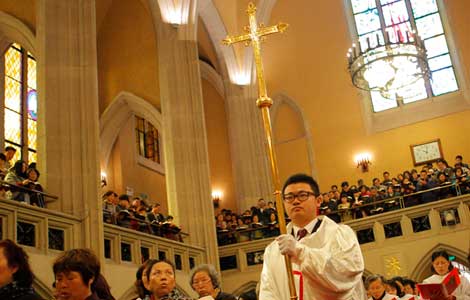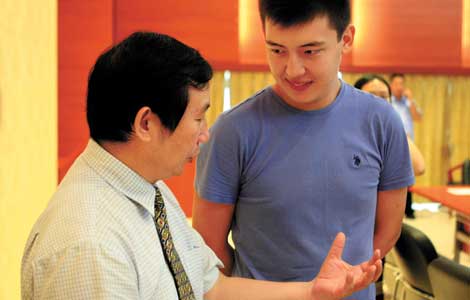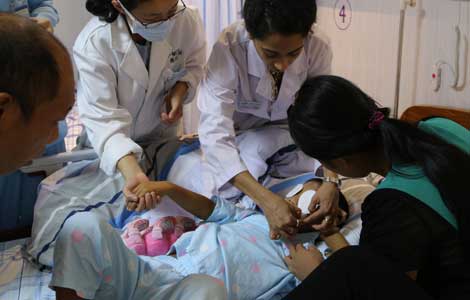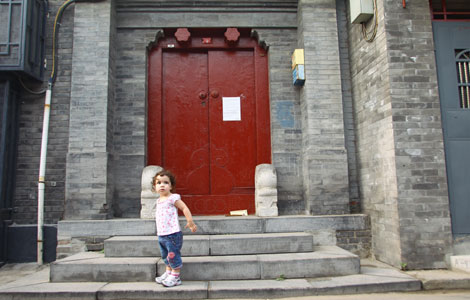Education Ministry working to attract more rural teachers
Updated: 2013-09-12 02:41
By Zhao Xinying (China Daily)
|
||||||||
The Ministry of Education and education departments at all levels are seeking to improve the attraction of teaching in rural areas as an occupation.
Xu Tao, director in charge of teachers' affairs with the Ministry of Education, said the ministry had made efforts to raise the income of primary and middle school teachers, especially those in rural areas.
Xu said the ministries of education and finance would soon issue a notice to support local governments in granting allowances to rural teachers, especially those working in impoverished areas.
Xu said, "Local governments should give allowances to teachers first and then the two ministries will distribute funds to the local governments, as support and reward for the governments' endeavors to raise teachers' incomes."
There are already about 600 counties, mainly in Hunan, Jiangxi, Hebei and Hainan provinces and the Xinjiang Uygur autonomous region, that provide allowances to more than 1 million rural teachers.
"As a result, the living conditions of these teachers has improved greatly," he said. "And these provinces and regions, in return, have attracted more and more teachers to devote themselves to working in impoverished rural areas."
Tian Jigang, a teacher at Mawangxi Primary School in Luxi county, Hunan province, said he had for a long time considered transferring to an urban primary school because his income was so low.
In 2009, he changed his mind after he started receiving allowances targeted exclusively at rural teachers.
The allowance, granted by the local government, was 300 yuan ($49) per month for each teacher at a rural primary school.
In 2010, it increased to 600 yuan, and the following year it doubled again. Tian now receives a total monthly government allowance of 1,400 yuan.
Tian said the allowance had reduced his stress and his whole family is now better off.
"In 2010, my family bought an apartment in the county, for which we pay 600 yuan each month," he said. "With the allowance, that monthly payment is no longer a burden."
Xu said more than 200 urban teachers have volunteered to work in rural schools annually since the county started granting allowances.
"This is a situation we long for. So we need to support and reward the local governments, encouraging them to continue investing more in improving rural teachers' incomes and living conditions."
Around 6.2 million primary and middle school teachers work in rural areas of China, accounting for 70 percent of the total number of teachers working in compulsory education (from primary to high school), according to statistics from the Ministry of Education.
Xu said these teachers encounter far more difficulties than their urban peers. There are more than 100 million students in those schools, which means the teachers face arduous workloads. Working and living conditions are also harsh for these teachers, and they live under greater pressure.
"We hope that one day teachers in rural areas can receive the same or even a higher salary than their urban peers," Xu said. "They deserve it."
Yin Changchun, deputy director in charge of teachers' affairs with the Ministry of Education, said the central government had taken several steps to improve the lifestyle and income of rural teachers.
In 2007, the Ministry of Education joined the Ministry of Finance and the Ministry of Human Resources and Social Security to release a notice requiring that the salary of primary and middle school teachers should rise by 10 percent. The salary of teachers who volunteer to work in rural areas should also be improved one or two grades.
In 2009, performance-related pay was introduced to teachers' incomes. "Rural teachers were favored in the policy, and their income has increased by 30 percent since then, while that of their urban peers has risen by only 10 percent," Yin said.
"We will go on cooperating with other ministries to raise rural teachers' incomes and improve the attraction of the career," he said.
"We always say we should promote equality of education. However, teachers, as a core element of education, should also be paid a lot of attention," Xu said. "I think promoting equality in teachers' incomes is a good start to realize equality in education."

 China's Christian churches reduce leaders' age ceiling
China's Christian churches reduce leaders' age ceiling
 Student's rare blood bonds Kazakhstan and China
Student's rare blood bonds Kazakhstan and China
 Apple's low-end phone price disappointing
Apple's low-end phone price disappointing
 US marks 9/11 anniversary
US marks 9/11 anniversary
 German Bach elected as IOC president
German Bach elected as IOC president
 Implant surgery for boy's eyes a success
Implant surgery for boy's eyes a success
 Hutong life facing change
Hutong life facing change
 New York Fashion Week in session
New York Fashion Week in session
Most Viewed
Editor's Picks

|

|

|

|

|

|
Today's Top News
Report questions US firms pursuing cloud computing in China
Reducing poverty gains momentum in Asia
China turns to US sorghum for animal feed
Russia proposal likely to avert US airstrikes
Li stresses transformation of economy
FM dismisses Philippine accusations
China's global firms face 'trust gap'
Shanghai gets tips on innovation
US Weekly

|

|






